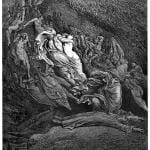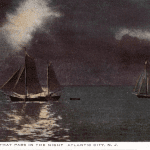
[The Presbyterian’s words will be in blue]
Kinda sorta like when my parents promised me a spanking when we got home. But doesn’t Christ’s dealing with sin seem thorough enough?
“He is the radiance of the glory of God and the exact imprint of his nature, and he upholds the universe by the word of his power. After making purification for sins, he sat down at the right hand of the Majesty on high…” (Hebrews 1:3, emphasis mine)
50 Bible Passages on Purgatory & Analogous Processes
25 Bible Passages on Purgatory
C’mon, Dave! I told you how as a Calvinist I approach Scripture, that a doctrine must be deduced “…by good and necessary consequence” (Westminster Confession 1.6, emphasis mine). Ergo, you should have known the Scriptures your article cited would never convince a Calvinist.
And you didn’t answer my question, either.
By the way, considering the multiple chastising I’ve received already, I figure if there is a purgatory, it must be now!
If this is your purgatory, God is having great mercy on you!
Of course you wouldn’t be convinced. It’s because Protestants have a strong unbiblical tradition of demanding that everything is absolutely explicit in the Bible before it can be believed (minus the biblical canon and sola Scriptura and many minor things; for example, church buildings, which aren’t mentioned in the New Testament).
Who am I to be able to overcome such strong arbitrary extrabiblical traditions?
Like the old saying goes: you can take a horse to the water, but you can’t make him drink.
Your question was obvious, so I didn’t think there was any need to answer, but here goes:
His death on the cross was super-sufficient by itself for our salvation, as we teach. Purgatory isn’t about salvation in the first place (all who are in purgatory are saved and will go to heaven), but about purging of sins left on our souls at death. That’s how God chose to deal with that: consistent with a strong motif in Scripture (the 50 passages in my paper above).
You guys think that God zaps us in an instant at death, and we are truly sin-free (not just “pretend” sin-free as in extrinsic justification).
We think it’s more of a process. But the essential idea (God makes us sin-free to enter heaven) is the same, and all agree on that, so it’s a fairly minor disagreement.
One reason I insist on my “extra-biblical tradition” (my “extra-biblical tradition”?! What about yours??)
“Every word of God proves true; he is a shield to those who take refuge in him. Do not add to his words, lest he rebuke you and you be found a liar.” (Proverbs 30:5-6 ESV)
Ergo, I try to be very careful!
And who can improve on this? Not even Calvin!
“The words of the Lord are pure words, like silver refined in a furnace on the ground, purified seven times.” (Psalms 12:6)
Peace!
Sure, we have extrabiblical traditions. They have to be harmonious with Scripture, as we believe they are. We don’t pretend to have none of those, when we clearly do. Your extrabiblical traditions go against your stated rule of faith (sola Scriptura: itself extrabiblical), so they are radically internally inconsistent and self-defeating.
This is the point. We are logically consistent and thoroughly biblical; Protestants are not. You are selectively biblical. You highlight passages that you falsely think support your views (when they differ with us) and ignore a host of other ones that refute your view.
You keep hangin’ around me and I’ll getcha to think like a Catholic in due course.
***
The other problem with Protestants and purgatory is that they believe in the false doctrine of imputed justification. They think God forgave and forgot all individual sins (past, present, and future) in one instant of justification. Then He no longer holds them to our account because of the cross.
But that is an unbiblical doctrine, which is why the Church fathers never taught it (even Norman Geisler and Alister McGrath concede that).
Since God “overlooks” our sins in that view, it makes no sense to talk of purging sins in the afterlife (they’re already “purged” because God supposedly chose not to see them or hold them against us).
So God forgives all our sins in an instant at justification, in the imputed / external / extrinsic sense. Then when we die He zaps us in one second and we are actually holy and sinless. Protestants seem constitutionally unable to grasp processes in the Christian life. We’re instantly “saved” and we’re instantly sanctified upon death. It’s the “fast food” version of Christianity. Nothing ever takes time or involves perseverance. We’re told that sanctification indeed takes time, but then it’s totally separated from justification and salvation.
When you and I meet in heaven, I’m gonna ask you “So how long were you in purgatory?”
You’ll say “if I’d listened to you, I’d have been spared a lot of anxiety. The blood of Jesus did cleanse me of all my sin!”
And I’ll smile and say “I won’t say ‘I told you so’ but…were you disappointed?!
The problem is that this is radically unbiblical. Scripture presents justification and sanctification as processes that are intertwined and ongoing. The 50 passages I provided show that the purging process is an ongoing one for human beings. We need to be constantly purified in this life from sins, and so we also do after we die, if they are still there on our soul, since nothing unclean can enter heaven.
Thus, Catholics view the thing consistently, before and after death (process). We have plenty of purging Bible passages that concern this life, and we have enough about the next life, to hold that purgatory is real and necessary.
But all these considerations explain why we see it plainly in Scripture and Protestants do not at all. It’s all about various presuppositions, and consistent Bible interpretation. Whenever a false presupposition is introduced, it upsets the whole balance and leads to false doctrines.
***
(originally 5-11-17)
Photo credit: Michael Mueller (12-21-16) [Flickr / CC BY 2.0 license]
***













